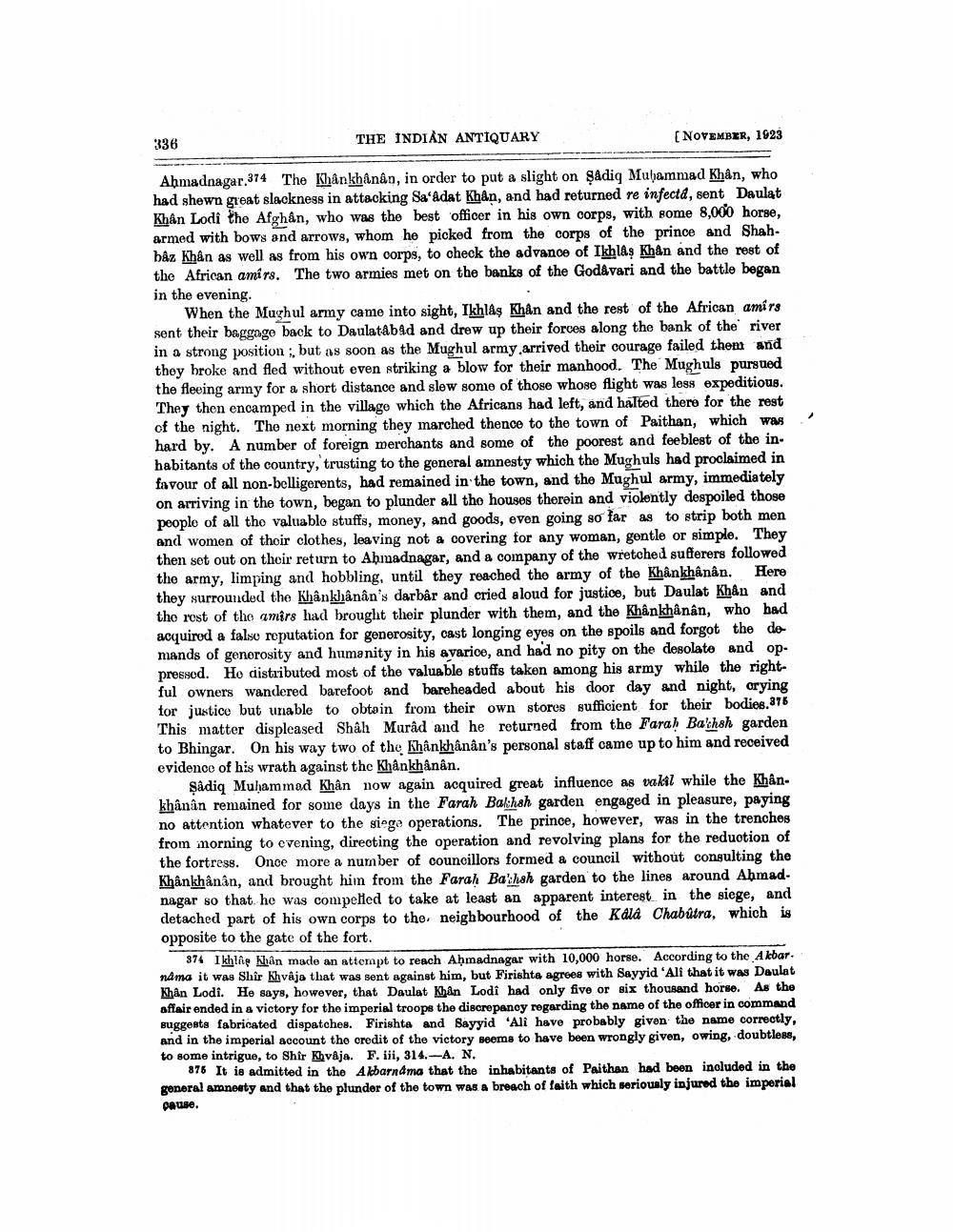________________
336
THE INDIAN ANTIQUARY
NOVEMBER, 1923
Ahmadnagar,374 The Khankhanan, in order to put a slight on Sadiq Muhammad Khan, who had shewn great slackness in attacking Sa'adat Khan, and had returned re infecta, sent Daulat Khân Lodi the Afghân, who was the best officer in his own corps, with some 8,000 horse, armed with bows and arrows, whom he picked from the corps of the prince and Shahbaz Khan as well as from his own corps, to check the advance of Ikhláş Khan and the rest of the African amirs. The two armies met on the banks of the Godavari and the battle began in the evening.
When the Mughul army came into sight, Ikhlas Khan and the rest of the African amirs sent their baggage back to Daulatábad and drew up their forces along the bank of the river in a strong position ; but as soon as the Mughul army arrived their courage failed them and they broke and fled without even striking a blow for their manhood. The Mughuls pursued the fleeing army for a short distance and slow some of those whose flight was less expeditious. They then encamped in the village which the Africans had left, and halted there for the rest of the night. The next morning they marched thence to the town of Paithan, which was hard by. A number of foreign merchants and some of the poorest and feeblest of the in. habitants of the country, trusting to the general amnesty which the Mughuls had proclaimed in favour of all non-belligerents, had remained in the town, and the Mughul army, immediately on arriving in the town, began to plunder all the houses therein and violently despoiled those people of all the valuablo stuffs, money, and goods, even going so far as to strip both men and women of thoir clothes, leaving not a covering for any woman, gentle or simple. They then set out on their return to Ahmadnagar, and a company of the wretched sufferers followed the army, limping and hobbling, until they reached the army of the Khânkhânân. Here they surrounded the Khânkhânân's darbâr and cried aloud for justice, but Daulat Khan and tho rost of the amirs had brought their plunder with them, and the Khânkhânân, who had acquired a false reputation for generosity, cast longing eyes on the spoils and forgot the de mands of generosity and humanity in his avarice, and had no pity on the desolate and oppressed. Ho distributed most of the valuable stuffs taken among his army while the rightful owners wandered barefoot and bareheaded about his door day and night, crying tor justice but unable to obtain from their own stores sufficient for their bodies.376 This matter displeased Shâh Murâd and he returned from the Farah Bakhsh garden to Bhingar. On his way two of the Khânkhânân's personal staff came up to him and received evidence of his wrath against the Khânkhånân.
Şadiq Muhammad Khân now again acquired great influence as vakil while the Khânkhânîn remained for some days in the Farah Bakhsh garden engaged in pleasure, paying no attention whatever to the siege operations. The prince, however, was in the trenches from morning to evening, directing the operation and revolving plans for the reduotion of the fortress. Onoe more a number of councillors formed a council without consulting the Khânkhânán, and brought him from the Farah Ba'shsh garden to the lines around Ahmad nagar so that he was compelled to take at least an apparent interest in the siege, and detached part of his own corps to the neighbourhood of the Kala Chabútra, which is opposite to the gate of the fort.
376 Ikhlive bån made an attempt to reach Ahmadnagar with 10,000 horse. According to the Albar. ndma it was Shir Khvajo that was sent against him, but Firishta agroes with Sayyid 'All that it was Daulat Khân Lodi. He says, however, that Daulat Khin Lodi had only five or six thousand horse. As the affair ended in a victory for the imperial troops the discrepancy regarding the name of the officer in command suggests fabricated dispatches. Firishta and Sayyid 'Ali have probably given the name correctly, and in the imperial account the credit of the victory seems to have been wrongly given, owing, doubtless, to some intrigue, to Shir Khv&ja. F. iii, 314.-A. N.
876 It is admitted in the Akbarndma that the inhabitants of Paithan had been included in the general amnesty and that the plunder of the town was a breach of faith which seriously injured the imperial cause.




